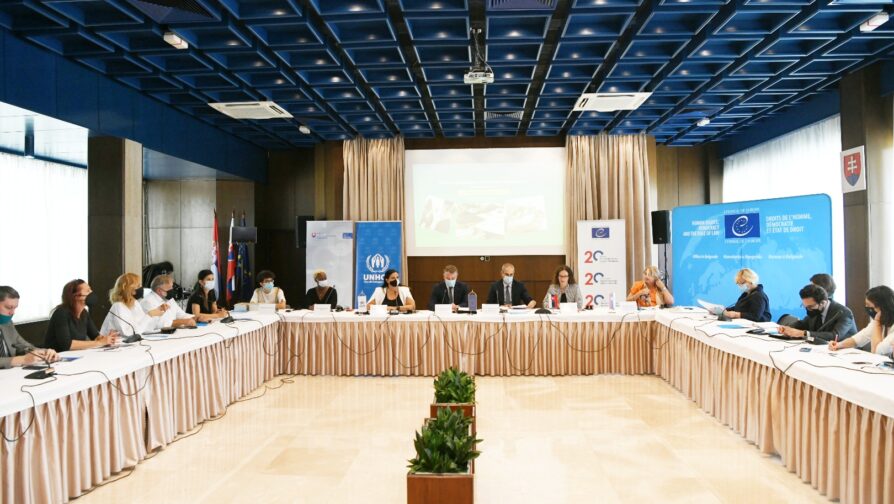The European Qualifications Passport for Refugees is a specially developed assessment scheme for refugees, even for those who cannot fully document their qualifications, providing an assessment of the higher education qualifications based on available documentation and a structured interview. The importance of such a scheme was discussed in Belgrade today, with participation of Drahoslav Štefánek, the Special Representative of the Secretary General on Migration and Refugees, Council of Europe.
“I am happy to host this evet at our premises, as it turns spotlight on a very important aspect of refugee´s life“, said Ambassador of the Slovak Republik to Serbia, Fedor Rosocha in his opening statement. „I welcome all efforts of the Council of Europe and UNHCR/UN agencies to improve the chances of this vulnerable group of people for their integration and progression towards employment or further studies.“
“The European Qualifications Passport for Refugees is a unique instrument providing refugees with an assessment of qualifications that cannot be fully documented. The passport methodology is based on the Lisbon Recognition Convention concerning Higher Education in Europe of the Council of Europe which Serbia joined 2004. We are looking forward to refugees being able to fully enjoy their rights and freedoms, including to continue their studies or find a job related to their education in Serbia or elsewhere in Europe“, said Tobias Flessenkemper, Head of the Council of Europe Office in Belgrade.

Kathia Katihabwa Irakoze, student, refugee from Burundi and Francesca Bonelli, UNHCR Representative in Serbia.
“We are very pleased that Council of Europe, Ministry of Education, Agency for Qualifications and National Employment Service and UNHCR will bring new opportunities to the refugee population in Serbia through the European Qualifications Passport for Refugees. This is an important document for refugee students, if they decide to continue studies here or work with their previously acquired qualifications which are now going to be recognised”, Francesca Bonelli, UNHCR Representative said.
Drahoslav Štefánek, Special Representative of the Council of Europe Secretary General on Migration and Refugees, highlighted that the European Qualifications Passport for Refugees (EQPR) is a tool to promote the integration of refugees which is included in the new Council of Europe Action Plan on Protecting Vulnerable Persons in the Context of Migration and Asylum in Europe (2021-2025). “For instance, the EQPR helped find qualified refugees in the health sector during the pandemic, and only last week a training module was held for credentials evaluators assessing the qualifications of Afghan nationals”, added Mr Štefánek.
Snežana Vuković, Head of Sector for Human and Minority Rights in Education, Ministry of Education, Science and Technological Development of the Republic of Serbia said that the Republic of Serbia has become an example in the European educational space in the field of education of migrants and asylum seekers through inclusive educational practice.
As she explained, since 2017, educational and psycho-social support in the process of education and upbringing has been provided for migrant students in schools. Since education is a basic human right, the Ministry of Education, Science and Technological Development has regulated this area by adopting expert guidance for the inclusion of refugee students / asylum seekers in the education system, but also improving the legal framework. So far, over 4,500 migrant students have successively passed through the education system. Applying the Professional Instruction, over 3,000 individual support plans for migrant students were developed, 115 support plans at the school level, over 10,000 additional hours of learning the Serbian language were held, peer support in learning was provided.

Info session on European Qualifications Passport for Refugees
At all levels of education, refugee enrolment is lower than that of non-refugees. The picture rapidly worsens as refugee children get older. UNHCR and partners have set an ambitious target globally, of 15 per cent for refugee enrolment at the tertiary level by 2030. The good news is that the most recent enrolment level for higher education is at 5 per cent, up from 3 per cent year-on-year and 1 per cent only a few years ago.
Serbia has also contributed to this trend. Following months of preparation for entrance exams supported by UNHCR partners, advocacy and communications with academic institutions, four young refugees, including two former unaccompanied and separated children from Afghanistan, a young man from Libya and a young woman from Burundi succeeded in enrolling into Belgrade Universities.
They represent a very important progress in Serbia of access to higher education for refugees .
Government of Serbia has highlighted the inclusion of children and youth from the refugee population in higher education as one of its pledges at the 2019 Global Refugee Forum.
Contacts:
Mona Alghaith, Council of Europe Office in Belgrade, [email protected] , +381 63 365 751
Dragan Vukotić, UNHCR Serbia, [email protected] , 381 63 434 527
Share on Facebook Share on Twitter